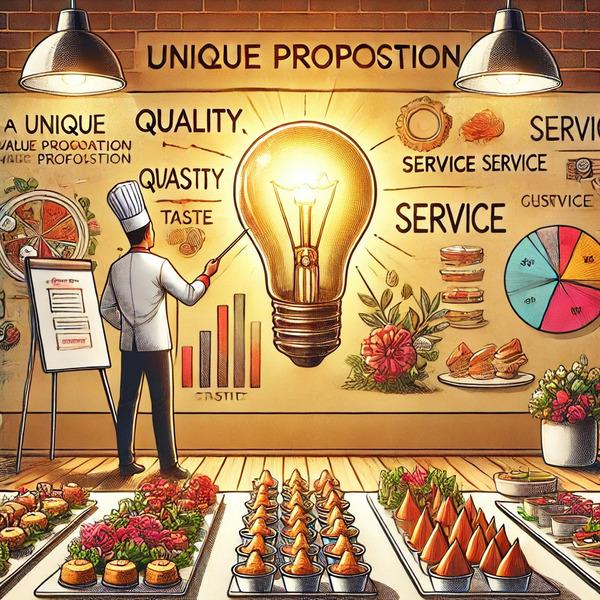Starting a small catering business offers an exciting opportunity to share delicious culinary creations with others, but it also requires effective marketing strategies to thrive in a competitive industry. To successfully market a small catering business, focus on creating a strong brand identity and understanding your target market’s needs. Leveraging this knowledge will allow you to tailor your services and marketing efforts precisely to attract and retain clients.
Implementing innovative marketing ideas can set a small catering business apart from larger competitors. From offering unique menu options to maximizing social media presence, each tactic plays a crucial role in visibility and client engagement. Professional photography, for example, can visually captivate potential clients by showcasing your signature dishes and events with high-quality images.
Promotions and special offers, such as discounts or seasonal menus, can also entice new clients, especially during peak seasons like weddings or holidays. Building a cohesive visual identity through a well-designed website, logo, and promotional materials helps establish credibility and trust with potential clients. In this digital age, a seamless online presence is essential.
Key Takeaways
- Understand your target market for tailored services.
- Build a strong brand with a cohesive visual identity.
- Use promotions and photography to engage clients.
Understanding Your Target Market
Effectively marketing a catering business requires a detailed grasp of your target market. By honing in on your ideal customer, analyzing competitor offerings, and employing market segmentation strategies, you can tailor your marketing efforts to maximize engagement and conversion.
Identify Your Ideal Customer
To pinpoint your ideal customer, start by considering your current clientele and their needs. Analyze patterns such as demographics, preferences, and purchasing behaviors. This includes aspects like age, income, location, and lifestyle choices.
Surveys and feedback from existing customers can yield useful insights. This data is key to understanding aspects like dietary preferences or event types your audience is interested in.
Create customer personas to visualize your ideal clients. These personas should include detailed profiles that represent your target audience, helping guide marketing decisions and strategies.

Analyze Competitor Offerings
Understanding competitive landscapes involves examining the services and pricing offered by other catering businesses. Delve into what competitors do well and where they fall short.
Conducting a SWOT analysis (Strengths, Weaknesses, Opportunities, Threats) can highlight areas where your business can differentiate itself, such as your unique culinary style or superior customer service.
Conversely, pay attention to their marketing tactics, like promotions and customer engagement strategies, to glean insights into what appeals to your shared target audience.
Market Segmentation Strategies
Market segmentation divides your target audience into smaller, more manageable groups with shared characteristics. This can be based on geographic, demographic, psychographic, or behavioral criteria.
Geographic segmentation considers location-based factors, helping businesses tailor their services to local tastes and preferences.
Demographic segmentation involves categorizing your audience by age, gender, income, and education level, ensuring your offerings align with their needs.
Psychographic and behavioral segmentation dig deeper into lifestyle, interests, and purchasing behavior. Crafting marketing messages that resonate with these specific segments enhances engagement and retention.
By implementing these strategies, you can tailor your marketing efforts to align closely with the specific needs and preferences of distinct customer groups, benefiting both your business and your clients.
Branding and Positioning Your Catering Service
Establishing a strong brand presence and clear market position can significantly enhance your catering business’s visibility and appeal. The focus should be on articulating a unique value proposition, crafting a compelling brand identity, and strategically positioning your service in the marketplace.
Developing a Unique Value Proposition
The unique value proposition (UVP) is the cornerstone of your brand. It defines what sets your catering business apart in a crowded field. To craft a compelling UVP, identify what your business does exceptionally well. This might be an exclusive culinary style, exceptional customer service, or a commitment to sustainability.
Clearly communicate how your service solves a problem or fulfills a need better than your competitors. This message should resonate with your target audience and be present in all marketing materials. Consistency and clarity are key to ensuring your UVP stands out and remains memorable to potential clients.

Creating a Memorable Brand Identity
Brand identity encompasses the visual and emotional elements that distinctively represent your catering business. Key components include your logo, color scheme, typography, and the tone of voice used in communications. These elements should align seamlessly with your UVP, reflecting the ethos and personality of your brand.
Invest in professional design services to create a cohesive look that is both attractive and relatable to your audience. A strong brand identity increases visibility and helps build trust. Additionally, ensure that all branded material consistently conveys the same message, reinforcing recognition and brand loyalty.
Effective Positioning in the Marketplace
Positioning involves strategically placing your brand in the market to appeal to your chosen demographics. Research and understand your competition to identify gaps or areas where your business can excel. Utilize differentiators such as pricing strategies, service offerings, or unique experiences to establish your niche.
Make use of digital marketing channels such as social media, SEO, and targeted advertising to enhance your market position. Additionally, leverage testimonials and reviews, as these can influence potential clients’ perceptions and preference towards your offerings. By clearly communicating your position, you’ll carve out a space where your business stands out and thrives.
Marketing Strategies for Attracting Clients
Implementing effective marketing strategies is crucial for small catering businesses aiming to attract more clients. By focusing on social media engagement, building strong networks, and utilizing content marketing and SEO, caterers can increase their visibility and appeal to a wider audience.
Leveraging Social Media Platforms
Social media platforms offer valuable opportunities for catering businesses to engage with potential clients and showcase their culinary offerings. Platforms like Instagram and Facebook are ideal for sharing high-quality photos and videos of your dishes and events, which can captivate and inspire your audience.
Creating interactive posts, such as polls and stories, encourages client participation and builds community. Using targeted ads and promotions increases your reach to specific demographics who are more likely to require catering services.
Engagement with followers through responding to comments and messages demonstrates customer commitment. Posting regularly and maintaining an aesthetic consistency aids in brand recognition and loyalty. Consider collaborations with influencers or local food bloggers to extend reach and credibility further.

Networking and Partnerships
Building a network of connections is invaluable in the catering industry. Establishing partnerships with event planners or venues can lead to frequent referrals and collaborative opportunities that benefit both parties.
Attending industry-related events, trade shows, and community gatherings enhances networking potential. Displaying your services at such events not only attracts potential clients but also provides the chance to interact directly with prospects.
Offering special packages to partner businesses, such as florists or decorators, encourages mutual promotion. By aligning with reputable businesses, your catering service can gain heightened exposure and credibility within the local market.
Content Marketing and SEO
Effective content marketing, paired with search engine optimization (SEO), elevates a catering business’s online presence. Publishing blogs or articles related to catering trends, recipes, or event planning tips attracts website visitors looking for relevant information.
Utilizing strategic keywords within your content helps improve search engine rankings. This increases the likelihood of your business appearing in search results when potential clients look for catering services.
Providing downloadable content, like checklists or guides, can capture leads by requiring contact details exchange. Consistent blogging and content updates signal to search engines that your site is active and valuable, contributing to better organic reach.
Engagement and Retention Tactics
Effective engagement and retention strategies are vital for small catering businesses to maintain customer loyalty and ensure repeat business. Key components include loyalty programs, customer feedback mechanisms, and well-structured email marketing campaigns.
Loyalty Programs
Implementing a loyalty program can significantly enhance customer retention by rewarding repeat business. Offer incentives such as discounts, free menu items, or exclusive access to new dishes to encourage customers to return. Create a simple point-based system where customers earn points with each purchase, redeemable for rewards.
Personalization can boost the effectiveness of loyalty programs. Tailor rewards to individual customer preferences and provide personalized offers based on past orders. A digital loyalty card can help customers track points and make the process seamless. Utilize apps or digital platforms to manage these programs efficiently, reducing administrative work and enhancing customer experience.
Customer Feedback and Improvement
Collecting and acting on customer feedback is crucial for continual improvement. Use surveys or feedback forms at the end of each catering event to gather insights. Keep questions concise and focused on critical areas such as food quality, service, and overall satisfaction.
Act on feedback promptly to show customers that their opinions matter. Implement changes where necessary and communicate these to clients, illustrating your commitment to quality. Encourage online reviews on platforms such as Google or Yelp to build your reputation and address any concerns publicly. Positive reviews act as endorsements, attracting potential clients.
Email Marketing Campaigns
Email marketing remains a powerful tool for engaging customers. Craft compelling emails with engaging subject lines and personalized content. Employ segmentation to tailor messages to different customer groups, ensuring relevance.
Include updates on new menu items, special promotions, or upcoming events. Use bold text and bullet points for clarity and emphasis. Incorporate a clear call-to-action (CTA) to encourage bookings or visits to your catering website. Monitor engagement metrics such as open rates and click-throughs to refine your campaigns. Regular emails help maintain a connection with your audience, keeping your brand at the forefront of their minds.

Innovative Services and Offerings
Introducing unique services and exploring diverse menu options can significantly differentiate a catering business. Emphasizing creativity, personalized menus, and environmentally conscious practices will engage clients and enhance your brand’s reputation.
Themed Catering Services
Themed catering services offer a distinctive approach that can make an event memorable. Consider specializing in various themes such as cultural cuisines, historical periods, or entertainment genres.
For example, a “Roaring ’20s” theme could feature Prohibition-era cocktails and vintage décor. Alternatively, catering a Hawaiian luau might include tropical dishes and traditional decorations. These customized themes enable clients to provide a cohesive experience for their guests, enhancing the overall event atmosphere.
Engage with clients to design themes that reflect their personal style or event purpose. This tailored approach can set your service apart and encourage word-of-mouth recommendations. By honing in on themed services, you captivate clients who seek personalized and exciting dining experiences.
Customizable Menu Options
Offering customizable menu options can directly cater to client preferences and dietary needs. Begin by providing various choices, including vegan, gluten-free, and allergen-conscious meals. Allow customers to select specific flavors, presentation styles, or cultural inspirations.
This personalization ensures satisfaction and transforms a standard meal into a bespoke experience. Clients appreciate the ability to adjust menus, whether for intimate gatherings or large events, to suit their guests’ tastes.
Create a detailed but flexible menu template that allows alterations in courses and ingredients. By aligning your offerings with your clients’ preferences, you foster a sense of inclusion and attentiveness that strengthens client relationships and enhances your business appeal.
Sustainability Practices
Implementing sustainability practices in catering can appeal to environmentally conscious clients. Start by sourcing local and organic ingredients to reduce the carbon footprint and support local economies. Use biodegradable or reusable serving materials to minimize waste.
Waste reduction can be achieved by accurately estimating food quantities and donating leftovers to local charities. Highlighting these practices in your marketing can boost your brand’s image and attract clients who prioritize eco-friendly initiatives.
Offer sustainable options like plant-based menus, which require fewer resources compared to traditional meat-centric menus. Engaging in sustainability showcases a commitment to environmental responsibility, adding value to your services and possibly gaining a loyal customer base.
Frequently Asked Questions
Small catering businesses can successfully increase their reach and attract clients through effective strategies, creative marketing techniques, and social media engagement. Thoughtful partnerships and community involvement also play a crucial role in enhancing visibility.
What strategies can you implement to market a small catering business effectively?
To market effectively, small caterers should establish a clear brand identity, utilize digital marketing, and tap into local networking opportunities. Creating a detailed plan based on their target audience’s preferences and setting measurable goals are key components of successful strategies. Developing partnerships with event planners can also be advantageous.
How can a caterer increase their brand visibility to attract more clients?
Increasing brand visibility can be achieved through consistent online presence, attending industry events, and maintaining high-quality customer service. Participating in community events or fairs also helps create awareness. Utilizing professional photography to showcase dishes enhances a caterer’s visual appeal to potential clients.
What are some creative marketing techniques that caterers can use to differentiate themselves?
Catering businesses can differentiate themselves by offering unique menu items, personalized service, and themed events. Hosting tasting events or participating in pop-up markets helps attract attention. Incorporating seasonal or locally-sourced ingredients can align the business with current trends, appealing to eco-conscious clients.
How can catering businesses leverage social media for promotional activities?
Social media platforms provide a powerful avenue for engagement and promotion. Regularly posting engaging content such as behind-the-scenes photos, customer testimonials, and special offers helps maintain client interest. Utilizing targeted advertising ensures the business reaches its desired audience.
What kind of content marketing should a small catering service focus on to engage potential customers?
Small catering services should focus on creating content that showcases their expertise and uniqueness. Blog posts featuring recipe ideas, hosting tips, and seasonal menus can engage potential clients. Utilizing video content or tutorials can highlight cooking techniques and industry insights, building a stronger connection with the audience.
What partnerships or community engagement can benefit the marketing efforts of a catering business?
Forming partnerships with local event venues or suppliers can lead to mutually beneficial marketing opportunities. Joining local business associations or participating in charitable events boosts visibility. Collaborating with wedding planners or corporate event organizers can open doors to exclusive client bases and enhance community ties.




